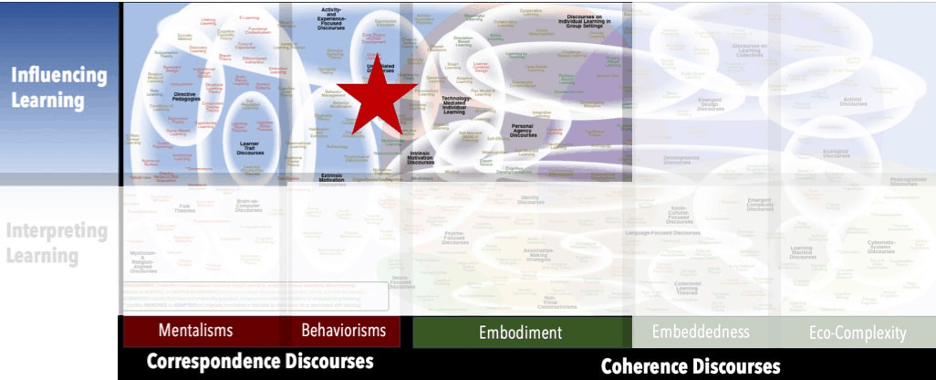AKA
21st Century Learning
21st Century Skills
Deep Learning
Non-Cognitive Skills
Transversal Skills
Focus
Reframing schooling to fit with contemporary circumstancesPrincipal Metaphors
- Knowledge is … achievement, accomplishment
- Knowing is … application (of appropriate knowledge)
- Learner is … a citizen-in-the-making (individual)
- Learning is … progressing, gaining
- Teaching is … instructing
Originated
2000sSynopsis
Deeper Learning is a blend of prominent contemporary educational discourses. It is aimed at transforming schooling in ways that fit with contemporary personal, social, cultural, and economic circumstances. There are many variations of Deeper Learning, but they tend to cluster around similar goals (e.g., robust academic outcomes, higher-level thinking skills, positive attitudes, technological proficiency, strong social skills) and instructional emphases (e.g., focus on real-world issues and problems that are relevant to learners; learner choice within tasks; access to appropriate tools and resources; flexible and frequent formative assessments, from teacher, other students, and self; numerous and varied opportunities for collaboration). Associated discourses include:- Changemaking – a perspective on formal education that positions the nurturing of knowledge and mindsets as the means to improving collective circumstances. Common emphases of Changemaking include the empathy, collaboration, shared leadership, and social innovation.
- 5E Instructional Model (Rodger Bybee, 2000s) – standing for Engagement, Exploration, Explanation, Elaboration, and Evaluation, a five-stage model for teaching that’s intended to blend Deeper Learning with emergent trends in STEM education
- 4-H Life Skills (originated by A.B. Graham in the early 1900s; formally developed into a model in the 1980s) – a model developed to help young people build competencies for personal and professional success, based on the “four H’s”: Head (thinking and managing), Heart (relating and caring), Hands (giving and working), and Health (living and being)
- Habits of Mind (16 Habits of Mind) (Art Costa, Bena Kallick, 1980s) – a set of life-related skills deemed essential for effective functioning in today’s world, including: persisting, managing impulsivity, listening empathetically, thinking flexibly, thinking metacognitively, striving for accuracy, posing problems, applying prior learning, communicating clearly, gathering useful information, innovating creatively, responding with wonderment, taking appropriate risks, finding humor, thinking interdependently, and learning continuously
- Knowledge, Skills, and Abilities (Knowledge, Attributes, Skills, and Experience [KASE]; Knowledge, Skills, Abilities, and Other Characteristics [KSAOs]; Knowledge, Skills, and Attributes [KSAs]) (1970s) – checklists of qualifications and performance standards, initially developed within the career world, that were adopted/adapted by formal education in the 1980s to elaborate the narrow focus of modern schooling on academic curricula
- Social Innovation Education (Education for Social Innovation; Socially Innovative Education) – a business-based model of formal education in which the development of entrepreneurial attitudes is typically positioned as the most effective route to social innovation (i.e., development of new practices to better address social needs, such as education and well-being)
- Soft Skills Training – experiences intended to support the development of capacities associated with effective functioning in social situations – especially career-related ones. Lists of Soft Skills tend to be tailored to roles and contexts, but the following are common entries: interpersonal skills, teamwork, communication, problem-solving, adaptability, time management, leadership , and work ethic
Commentary
Deeper Learning can be read as an uncritical mash-up of prominent contemporary discourses on teaching. Even though proponents commonly assert that it is rooted in and/or aligned with Progressivism, descriptions are typically reliant on the Acquisition Metaphor, the Attainment Metaphor, and Instructivism. In addition, while the explicit emphasis is almost always on nurturing the individual, its less-prominent rationale statements are usually framed in terms of societal and economic need. Stated more concisely, Deeper Learning tends to be presented and perceived as belonging among Coherence Discourses, with a focus on the individual, but the assumptions and aims laid out in its rationale statement are more consistent with society-privileging Correspondence Discourses.Authors and/or Prominent Influences
Partnership for 21st Century Learning (P21; formerly Partnership for 21st Century Skills)Status as a Theory of Learning
Deeper Learning does not invoke, let alone seek to contribute to, recent insights into the complex dynamics of human learning.Status as a Theory of Teaching
Deeper Learning can be properly viewed as a set of prescriptions for the means and outcomes of formal education. While it would be a stretch to call Deeper Learning a discourse on teaching, it is correct to assert it is intended to influence what goes on in schools.Status as a Scientific Theory
Deeper Learning is a political discourse, not a scientific one. While there are frequent references to, for example, best practices, evidence-based practice, and demonstrable results, the fact of the matter is that its defining principles and recommendations are not drawn from scientific sources. Rather, they represent little more than the current “common sense” of schooling, as is most clearly evidenced in the dominance of images and metaphors of Folk Theories that are invoked by its proponents.Subdiscourses:
- Changemaking
- 4-H Life Skills
- 5E Instructional Model
- Habits of Mind (16 Habits of Mind)
- Knowledge, Skills, and Abilities (Knowledge, Attributes, Skills, and Experience [KASE]; Knowledge, Skills, Abilities, and Other Characteristics [KSAOs]; Knowledge, Skills, and Attributes [KSAs])
- Social Innovation Education (Education for Social Innovation; Socially Innovative Education)
- Soft Skills Training
Map Location

Please cite this article as:
Davis, B., & Francis, K. (2025). “Deeper Learning” in Discourses on Learning in Education. https://learningdiscourses.com.
⇦ Back to Map
⇦ Back to List
